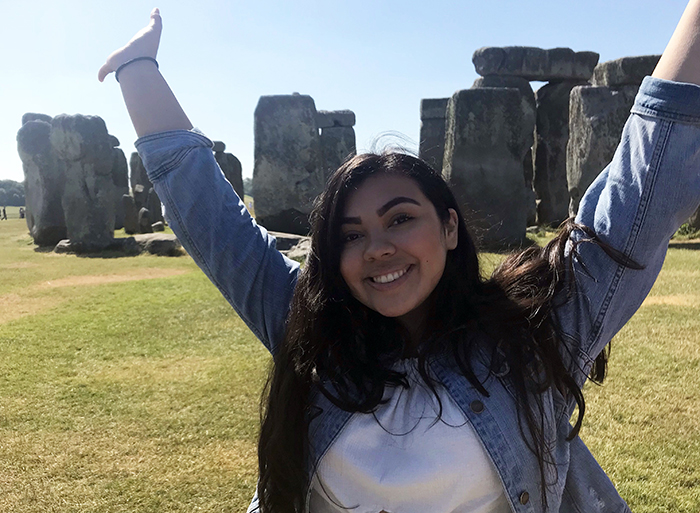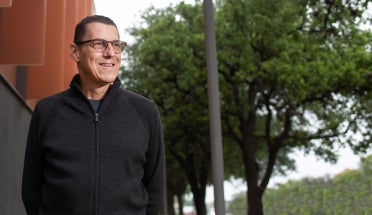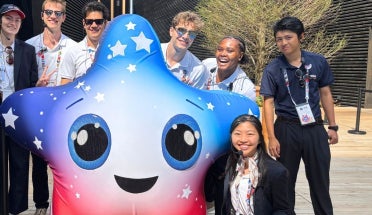
Journalism Student Finds Home in Fast-Paced London
- Nov 30, 2018
- Education Abroad
London may be a busy, cosmopolitan and touristy city, but for journalism student Brianna Rodriguez, it was a temporary home that allowed her to grow personally, academically and professionally. Her experience studying abroad in London and interning at CBS News’ London Bureau this past summer allowed her to be more adaptable to a rapidly changing environment and prepared her for a career in broadcast news.
But her time abroad wasn’t all work. Rodriguez was able to expand her views of the world as a student and learn about the culture in the UK – which, despite sharing a common language, can be really different from American culture. Through her class field trips, she could also explore London from a different perspective.
Rodriguez is a Hutchison International Scholar and a recipient of the Benjamin A. Gilman International Scholarship, a national scholarship funded by the U.S. Department of State. We reached out to her to learn more about her experience.
Brianna, can you tell us about yourself and what you are studying?
I’m a journalism student with a concentration on broadcast and minor in Latino Media Studies.
How did you select your program?
I knew I wanted to go somewhere that is constantly busy. I also wanted a program that could help me better prepare for a fast-paced work environment, which is what I expect going into broadcast news. Arcadia in London’s internship and study program fit all of my criteria, so I knew it was the right program for me.
What motivated you to participate in this international experience?
I wanted to get out of my comfort zone, and I was lucky enough to have scholarships to do so. Unfortunately, I wouldn’t have been able to take this incredible leap if it was not for the help. I wish everyone could experience this.
How many classes did you take?
I took one journalism class and a class that is supposed to parallel with my internship. The classes were enjoyable. My journalism class went on “field trips” all the time, which allowed me to see more of London than I would on my own.
Where did you intern? What did a typical day look like in your working site?
I’m interning at CBS News’ London bureau. Because the newsroom changes like the headlines, I don’t even have a typical day. I get to talk to the correspondents –– yes, the ones we see on TV and yes, I try super hard not to look as starstruck as I feel –– and get to read stories before they’re released. My desk is two away from the bureau chief, which is crazy and amazing. It’s honestly the best thing ever to work there.
"As a person, I had the opportunity to understand different cultures. The funny thing is that I didn’t expect the UK to be so different than the US because we share English as a popular language. I was so wrong. I learned to adjust and respect the cultures around me."
What was your favorite part of studying abroad? What was the most challenging part?
My favorite part was going to the Senate House Library and being around other college-age British students. We did not have local students in the program, but they were always at the library because it is near one of the big London universities.
The most challenging part was getting used to a new grading system and lingo. There were British professors that worked in the program, and we had a crash course on what they actually meant when they said certain phrases. For example, “this is quite good” meant the complete opposite.
How did the experience help you develop as a person, as a student, and as a professional?
I’m independent and know I can count on myself to figure things out when I’m stressed. For instance, if I was nervous about getting lost, I would make sure to be extremely detail-oriented about my plans. I even came up with back up plans. I’m also better with handling money because I had to be smart about how I spent money.
As a person, I had the opportunity to understand different cultures. The funny thing is that I didn’t expect the UK to be so different than the US because we share English as a popular language. I was so wrong. I learned to adjust and respect the cultures around me.
As a professional, I had to get myself places on time, learn to maneuver public transportation, and manage my time properly between having a social life and being responsible with work.

Apply to as many scholarships as possible. Even if you think it’s a long shot. I was in the same scary predicament, but I took chances and am being rewarded for that.
Taking chances is a terrifying thing to think about—especially when you grow up or are currently in a financial position that may not allow you to. It’s nerve-racking when you’re not in a position where you can take these 'risks' with no consequence, but it’s more feasible than you think. No matter our situations in life, our dreams are achievable."
Brianna, as a Hutchison International Scholar you are part of an elite group of Longhorns who are academic high achievers and first-generation college students. How did this opportunity support your international studies?
The Hutchison International Scholarship did not just support my international studies, it propelled it. I wouldn’t have seriously considered going abroad had it not been for the scholarship. Having the monetary helped to alleviate so much stress from my family.
You are also a recipient of the U.S. Department of State’s Benjamin A. Gilman International Scholarship. Tell us how the Gilman Scholarship helped support your international experience.
The Gilman Scholarship came at the perfect time. I was nearing departure, and I was still nervous about finances since London is an expensive city. Having the Gilman Scholarship was a blessing. I have contact with the U.S. Embassy if need be, and I get to pay even more attention to my time here than I would without it because of my project I’m doing for the scholarship.
Did you receive any other scholarships?
Arcadia, my host school, gave me a $1000 scholarship.
In your opinion, why shouldn't students miss the opportunity to study abroad?
Studying abroad gives you a piece of culture, life and courage that you can't obtain by staying in the United States throughout your time in college. The diversity, experiences and lessons I have learned are going to stay with me forever.
Do you have any advice for students who are considering studying abroad in the upcoming year? How early should they start preparing?
If you are thinking about applying to study abroad, do it!
Then, start saving up money, researching the culture in the area you want to go and, last but not least, relax. The study abroad office at UT is so helpful, and you will always find your questions answered in a timely manner.
"My views of the world as a student are broadened. I’ve walked around cities that Jane Austen wrote about, visited the grave of the philosopher of Karl Marx and more."
Any special advice to students who think that they might not be able to financially afford a study abroad experience?
Apply to as many scholarships as possible. Even if you think it’s a long shot. I was in the same scary predicament, but I took chances and am being rewarded for that.
Taking chances is a terrifying thing to think about—especially when you grow up or are currently in a financial position that may not allow you to. It’s nerve-racking when you’re not in a position where you can take these “risks” with no consequence, but it’s more feasible than you think. No matter our situations in life, our dreams are achievable.
Based on your experience, what are three things students should do when studying or interning abroad?
Talk to locals! Listen to their accents, learn the local lingo and ask them for recommendations on where to go.
If you can, do some exploring on your own. It’s refreshing, and you can exercise your independence.
Try not to focus too much on what is going on at home. Of course, check in on your loved ones often. But remember that you’re spending money to temporary live abroad and actually do that. Live in the moment.
Why do you think it is important to acquire an international education as an undergraduate student?
My views of the world as a student are broadened. I’ve walked around cities that Jane Austen wrote about, visited the grave of the philosopher of Karl Marx and more. The education I’ve learned throughout my years as a student has really come alive since I’ve been abroad. It has taken shape and become even more real and palpable.
How do you think this experience will benefit you in the short and long-term?
I can now consider myself a more well-rounded, multi-faceted student who can quickly acclimate to strange surroundings. In the future, I’ll be understanding, respectful and appreciative of the cultures around me, more than I had been before.
What are your plans after graduation? What are your long-term goals?
My plans after graduation are to find a job as a multimedia journalist or producer at a local station. It’s important for me to tell people’s stories and always learn something new.
Learn more about the Hutchison International Scholars and the Benjamin A. Gilman International Scholarship



